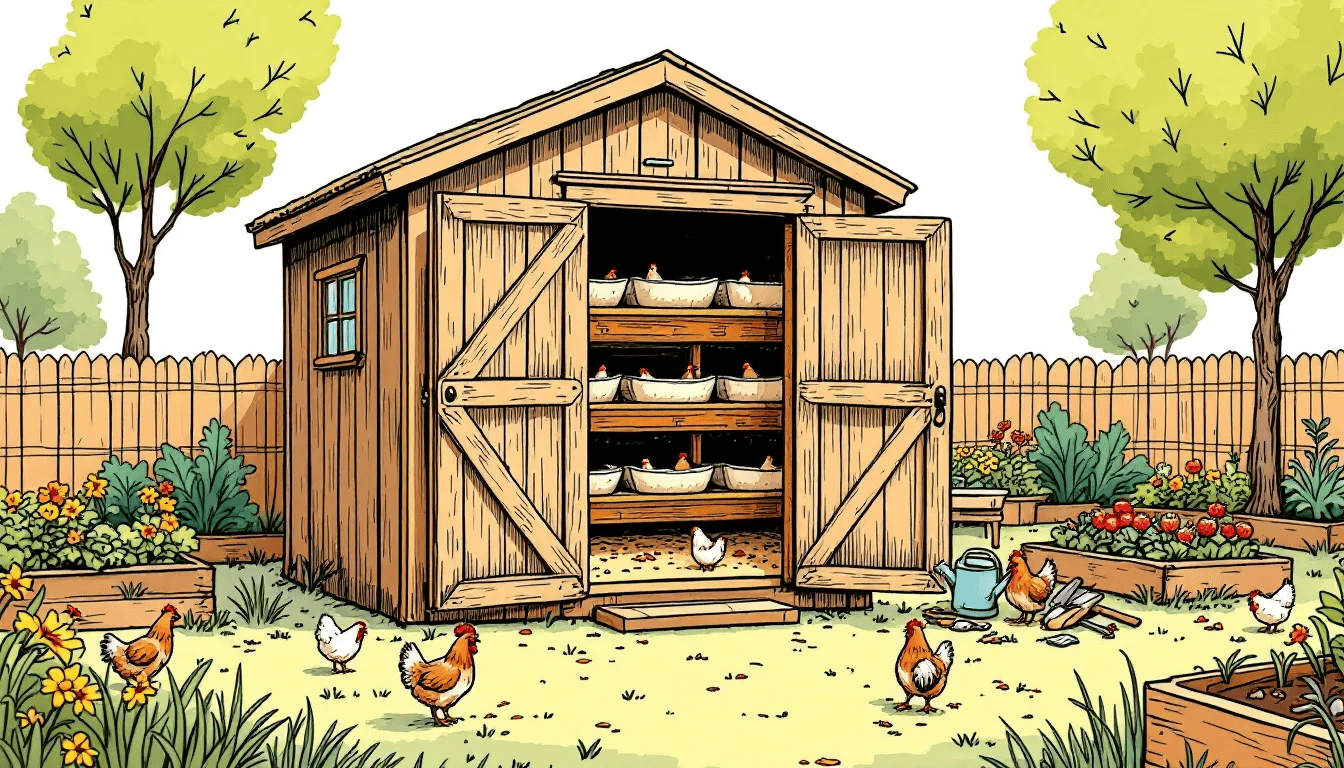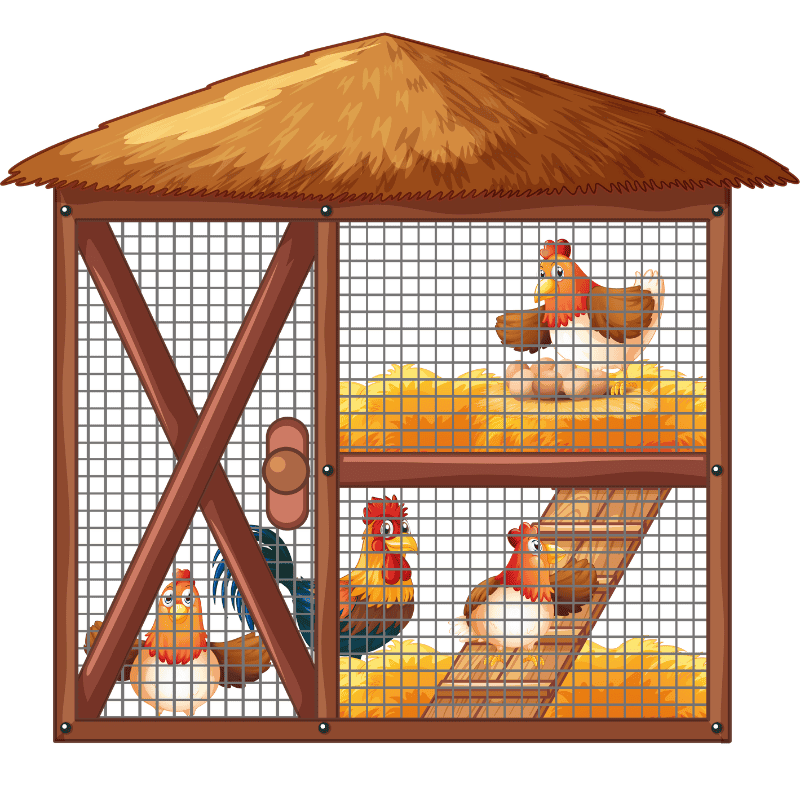Guide to Raising Chickens for Beginners: How to Start a Backyard Flock

Starting your journey with backyard chickens? You’re about to discover one of the most rewarding hobbies around! This guide will walk you through everything you need to know about raising chickens, from setting up your first coop to collecting those amazing fresh eggs.
Key Steps to Raising Chickens for Beginners
Backyard chickens are amazing multitaskers – they provide fresh eggs, help with pest control, and create fantastic fertilizer for your garden.
Success starts with good planning: checking local regulations, creating proper housing, and selecting the right breeds.
With the right preparation and care routine, your chickens will thrive and become wonderful additions to your backyard.
Why Raise Backyard Chickens?
There’s something special about walking out to your backyard to collect fresh eggs for breakfast. But backyard chickens offer so much more than just eggs. These industrious birds are natural pest controllers, happily foraging for insects and keeping your yard tick-free. Plus, they produce chicken manure that’s packed with nutrients – it’s like having your own garden fertilizer factory!
For families with children, chickens make surprisingly engaging pets. Each one has its own personality, and watching them interact can provide hours of entertainment. Best of all, the
Getting Started: Planning and Preparation
Before bringing home your first chickens, let’s get everything in order. Start by checking your local ordinances about keeping backyard chickens – most areas allow around five or six hens, but it’s important to verify the specifics for your location. This step saves you potential headaches down the road.
Think of your chicken setup like creating a tiny homestead. You’ll need:
A secure, comfortable coop
Quality feeding equipment
Appropriate bedding materials
Basic maintenance tools
Choosing the Right Chicken Breeds

When starting your backyard flock, selecting the best chicken breeds makes all the difference. For backyard chickens that excel at egg laying, Rhode Island Reds and Barred Rocks are wonderful choices. These egg-laying chickens are known for their impressive egg production and friendly personalities, making them perfect for raising backyard chickens.
If you’re dealing with cold winters, consider hardy breeds like Plymouth Rock, Ameraucana, and Buff Orpington. These chicken breeds have smaller combs (the red things on the top of their heads), which helps protect them from frostbite. Young birds from these breeds adapt well to various climates, making them excellent egg layers for your backyard flocks.
Buff Orpingtons are particularly great for new chicken keepers. These healthy hens consistently produce large, brown eggs and have gentle personalities. Want something special? Easter Eggers can add variety to your egg production, laying eggs in unique colors. (As a fun side note, these brown and green eggs are lots of fun coloring for Easter with kids- you get completely new colors!)For warmer regions, consider breeds like Turkens, which maintain strong egg-laying capacity even in heat.
When selecting your first chickens, it helps to understand their lifecycle and how different breeds develop. To learn about the chicken lifecycle, click here. This will help you know what to expect as your chickens grow.

Setting Up Your Chicken Coop
Your chicken coop is more than just a shelter – it’s your flock’s home base where they’ll sleep, lay eggs, and seek protection. Getting the basics right makes a big difference in your chickens’ happiness and productivity.
Space planning is straightforward: provide 2-4 square feet per chicken inside the coop and at least 10 square feet in the run. For nesting boxes, think cozy rather than spacious – one cubic foot per box works well, with one box for every four hens. Most hens are pretty agreeable about sharing! It is not unusual for us to go into our chicken coop and find two or three hens in one hen box.
When it comes to roosts, flat perches placed 12-18 inches above the floor give your birds a comfortable spot to sleep while preventing foot problems. Good ventilation is essential – think of it like opening windows in your house. Fresh air keeps moisture down and helps prevent health issues, especially during cold months.
Speaking of protection, think like a predator when securing your coop. Hardware cloth works better than chicken wire for keeping out unwanted visitors, and raccoon-proof latches are worth the extra investment. For bedding, you can’t go wrong with straw or pine shavings – both keep the coop clean and dry while being easy to maintain.
When you’re dealing with cold winters, keeping your healthy flock comfortable makes a big difference. While most chicken breeds handle cold pretty well, you’ll want to protect them from frostbite during extreme weather. The coop itself should be draft-free but still have good ventilation – think of it like a winter jacket that breathes. Deep bedding of straw or pine shavings provides extra insulation on the floor space inside.
Here’s a pro tip: your chickens’ body heat can usually keep a well-insulated coop warm enough, especially when they roost together at night. If temperatures drop extremely low, consider adding a flat-panel radiant heater mounted safely out of reach. Remember, you’re aiming to take the edge off severe cold, not create tropical conditions! Most healthy hens adapt well to cold weather as long as they have proper shelter, fresh water (use a heated waterer to prevent freezing), and plenty of feed to keep their energy up.

Feeding Your Chickens
Your chickens need good nutrition to stay healthy and lay plenty of eggs. When you’re raising backyard chickens, getting the feeding routine right makes all the difference in your egg production.
Young chicks need special chick feed with extra protein to grow into healthy hens. Once your chickens are grown, a quality commercial chicken feed provides the perfect foundation for egg laying chickens. Whether your chickens free range or stay in their coop, they need constant access to fresh water and their prepared feed.
Want to supplement their diet and save money? Your chickens will love kitchen scraps like herbs, tomatoes, squash, and berries. Just remember to keep their regular chicken feed as the main course. For strong egg shells, your hens need extra calcium – oyster shells are perfect for this. A dish of oyster shells kept separate from their regular feed lets them take what they need.
Raising Baby Chicks
Starting your backyard flock with baby chicks lets you build a bond with your birds from day one. You can find healthy chicks at local farm supply stores, through NPIP-participating breeders, or even from farm sanctuaries.
When raising chicks, setting up a safe brooder is your first step. These young birds need special care in their first few weeks. Skip open water containers – they’re too risky for baby chicks who could fall in. Instead, use special chick waterers that prevent drowning while keeping their water fresh and clean.
Your young chicks will naturally want to perch, so include a low roosting pole in their brooder. Keep them cozy with a heat lamp until they develop their feathers, and feed them special chick feed to support their growth into healthy chicks. Regular health checks help ensure they’re growing into strong, healthy hens for your backyard flock.

Daily Care and Routine
Taking care of backyard chickens isn’t complicated, but it does need consistency. Your daily chicken checklist includes checking food and water levels – these busy birds can go through their supplies quickly!
Fresh water is especially important for healthy hens and steady egg production. Collecting eggs daily keeps them clean and fresh. During warmer months, when your chickens are most active, you might find yourself gathering eggs twice a day. Here at our house, we generally collect the eggs in the morning and at night when we feed them. It becomes a pleasant ritual – there’s something special about finding fresh eggs in the nesting boxes.
When your backyard chickens have access to the run, make sure to check there for eggs, too, especially in summer. Even with perfect nesting boxes in the chicken coop, some free-range chickens prefer to lay their eggs in sneaky spots around the run! We’ve found eggs tucked behind feed containers, under bushes, and in quiet corners of the run. Making these “egg hunting” rounds part of your daily collection routine helps ensure you don’t miss any of your chickens’ fresh eggs. PLus, the kids think egg hunts are fun!
Some people worry that keeping chickens is too much work, but once you get into a routine, caring for your backyard flock becomes second nature. A few minutes in the morning and evening usually do the trick. Think of it like feeding a cat or walking a dog – it’s just part of your daily rhythm.
Health and Wellness
Keeping your backyard chickens healthy isn’t hard when you know what to watch for. Regular health checks help your backyard flock stay in top shape – think of it as a weekly chicken wellness check! Watch your chickens’ behavior as they free range or move around their chicken coop, and keep an eye on their chicken poop – it can tell you a lot about your chickens’ health.
Good airflow in your chicken coop helps prevent respiratory problems in your egg-laying chickens. Your healthy hens need dust baths to keep themselves clean and pest-free – it’s like their version of a spa day! Adding food-grade diatomaceous earth to their dust bath spots helps control mites naturally.
To maintain a healthy flock, keep an eye out for new chickens that might bring in diseases. Just like humans, chickens can catch things from each other. When adding young birds to your existing flock, it’s smart to keep them separate for a while. A few weeks of “chicken quarantine” helps protect all your chickens and keeps your egg production steady.
Free-Range vs. Confined Chickens
Deciding whether to let your chickens free range or keep them confined is a big choice when raising backyard chickens. Free range chickens help with natural pest control by hunting bugs in your yard, and they love foraging through the grass for tasty treats. Plus, watching chickens explore and play in your vegetable garden (with supervision!) can be highly entertaining. Last summer, I would put a few chickens in my garden for a couple of hours in the morning to wage war on the grasshoppers destroying my squash plants. I will admit, though, that the hens thought the chase was way more fun than the grasshoppers.
But, when chickens free range, they need extra protection from wild birds and other predators. Good fencing helps keep your backyard flock safe, but you’ll still want to keep a watchful eye on them. Here at our place, our chicken’s free range in a pasture alongside our goats, which adds an extra layer of protection – the goats are great at spotting potential threats and alerting the whole gang! Plus, they are big enough to keep some problems away. Our coop is attached to the goat barn.
Some chicken keepers find that letting their chickens free range part-time – maybe in the afternoon when they’re home to supervise – gives them the best of both worlds.
If you’re interested in a middle-ground solution, consider a portable chicken coop (sometimes called a chicken tractor). These movable coops let your egg-laying chickens enjoy fresh grass and bugs every day while staying protected. Just shift the coop to a new patch of yard every few days, and your chickens get fresh foraging ground while staying safe from predators. It’s like having a mobile pest control team for your lawn!
Keeping chickens in a secure chicken coop and run has its benefits too. Your egg-laying chickens stay safer from predators, and it’s easier to monitor their health and egg production. Plus, collecting eggs is simpler when you know exactly where to look! If you choose to keep your backyard flock confined, make sure they have enough floor space inside to stay active and happy.

Managing Chicken Poop and Manure
Let’s talk about one of the less glamorous parts of raising chickens – dealing with chicken poop! Your backyard flock produces plenty of chicken manure, but don’t think of it as waste. This stuff is garden gold when handled properly.
Your chicken coop needs regular cleaning to stay fresh and healthy. Remove wet chicken poop daily if you can, especially during summer months when it attracts more flies. A good deep clean every 4-6 weeks helps keep your backyard chickens healthy and your coop smelling fresh. Adding a layer of straw or pine shavings to your coop floor makes cleanup easier and helps control odors.
Here’s where the magic happens – composting! Chicken manure is packed with nitrogen and other nutrients that your vegetable garden will love. But raw chicken poop is too strong to use directly on plants. Create a compost pile mixing your chicken manure with leaves, grass clippings, and other yard waste. After about six months of breaking down, you’ll have amazing fertilizer for your garden. At our place, we combine our chicken and goat manure with yard waste and kitchen scraps – by spring, we have the perfect compost for growing giant tomatoes!
To keep flies under control, consider adding food-grade diatomaceous earth to areas where chicken poop tends to accumulate. This natural powder helps dry out droppings and discourages pest problems without harming your healthy flock.
Dealing with Predators
Protecting your backyard flock from predators takes smart planning. Hardware cloth works better than chicken wire for your chicken coop – it’s stronger and keeps determined predators out. Bury it about 12 inches deep around your run to prevent digging.
Your coop needs secure latches that raccoons can’t figure out. A two-step system works well – try a sliding latch plus a carabiner clip. Add a sturdy roof or netting to protect from wild birds and aerial predators. Regular checks for wear and damage help keep your backyard chickens safe.
How Many Chickens Should You Start With?
When starting your backyard flock, it’s best to begin with 4-8 hens. Since chickens are social creatures, you’ll want at least three hens to keep them happy. A small flock this size can provide about a dozen fresh eggs each week – plenty for most families!
Your available space and local regulations will help determine your ideal flock size. Most areas allow backyard chickens but might limit how many you can keep. And remember – raising chickens becomes easier once you get into a routine, so starting small gives you time to learn the ropes.
Costs of Raising Chickens
Starting your backyard flock comes with some upfront costs. A basic chicken coop ranges from $100 to $1,000, depending on whether you build it or buy it. Baby chicks usually cost $2-10 each at local farm supply stores.
Monthly expenses for raising chickens run about $3-8 per bird. Commercial chicken feed is your biggest ongoing cost, with bags ranging from $14-40. To save money, consider building your own coop, buying used supplies, or sharing feed costs with other chicken keepers.
Do You Need a Rooster?
While roosters can help protect your backyard flock and make alarm calls, they’re not needed for egg production. Hens lay eggs just fine without one! One rooster can handle 8-10 hens if you do want fertilized eggs for hatching.
Just check your local rules first – many areas don’t allow roosters because of noise concerns. Plus, some roosters can be a bit rough with your egg-laying chickens, so think carefully before adding one to your flock.
Common Challenges and Solutions
New chicken keepers often wonder if raising chickens is worth the effort. While caring for your backyard flock does take time, most challenges have simple solutions. Chickens can get a bit bossy with each other – that’s their pecking order at work. Give them enough space in the chicken coop and run, and they’ll usually sort things out.
The Joy of Fresh Eggs

There’s nothing quite like collecting fresh eggs from your own backyard chickens! These eggs often have richer-tasting yolks than store-bought eggs, and knowing exactly how your egg-laying chickens are raised makes them even better. A small flock of five or six hens will keep most families well-supplied with fresh eggs daily.
Your chickens raised for eggs need clean nesting boxes to lay in, and checking them each day becomes a satisfying routine. Some folks even say their backyard flocks seem proud to present their daily gifts – and who are we to argue with a happy hen?
Summary
Raising backyard chickens brings so many rewards – from fresh eggs daily to the simple joy of watching your feathered friends explore your yard. With good planning and setup, your backyard flock can thrive whether they’re free range or in a cozy chicken coop.
Success with egg-laying chickens comes down to the basics: choosing healthy hens, providing proper housing, offering good nutrition, and keeping up with daily care. Your chickens need clean water, quality chicken feed, and safe nesting boxes to give you those wonderful fresh eggs.
Starting your journey into raising chickens might seem daunting at first, but take it from us – once you get into the rhythm, caring for your backyard flock becomes a natural part of your day. Ready to start your chicken-keeping adventure? Your future fresh eggs (and hours of chicken entertainment) are waiting!
Frequently Asked Questions
How many chickens should I start with as a beginner?
Starting with 4-8 hens is a great choice for beginners since they thrive in groups and it’s easier to manage. Just remember, at least three is the minimum to keep them happy and social!
Do I need a rooster for my hens to lay eggs?
No, you don’t need a rooster for your hens to lay eggs; they’ll keep laying without one. A rooster is only needed if you want fertilized eggs.
What are the ongoing costs of raising chickens?
Raising chickens typically costs around $3 to $8 per month per chicken, with feed being the biggest expense at $14 to $40 per bag. Keep in mind that these ongoing costs can add up, so it’s good to plan ahead!
How do I protect my chickens from predators?
To effectively protect your chickens from predators, use hardware cloth instead of chicken wire, install a two-step latch system on coop doors, and cover the run with a roof or netting. These steps will significantly enhance their safety.
What should I feed my chickens?
Feed your chickens a balanced pelleted feed tailored to their growth stage, complemented by garden scraps like herbs and berries. Don’t forget to keep their water supply fresh!




